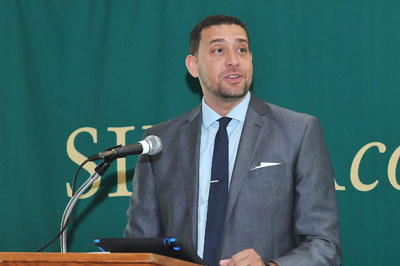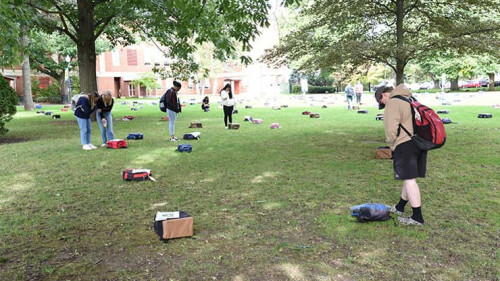

By Rebecca Davis '15
It has been 227 years since the founding fathers signed the Constitution of the United States and every September, the country and Siena College celebrate that pivotal moment in our nation’s history.
The College held an academic discussion that began with a performance of the “Star-Spangled Banner,” which was sung by the Siena Chamber Singers. Following the national anthem was the event’s keynote address by Albany Law School professor of law Christian Sundquist, J.D.
Sundquist is a nationally-recognized scholar on issues of race and law who has published and presented on issues in the fields of constitutional law, evidence law, immigration law, criminal race theory, education reform and welfare reform.
He delivered a speech titled “Constitutional Immigration Law: Membership in the American Political Community.” During his talk, Sundquist explained that the United States is a country of immigrants that promotes “equality for all”, yet many past and present policies do not reflect that sentiment.
“This presentation will give us more insight into a big issue right now, immigration policies,” said economics major Ryan Boyle ’15. “It’s something everyone needs to pay attention to.”
Sundquist taught a course on comparative immigration law to American and South African students in Cape Town, South Africa last summer. During his Constitution Day speech, Sundquist compared South Africa’s narrow immigration laws to those of the United States. He then gave a history of United States policies, from the citizenship of African Americans, to The Chinese Exclusion Act, to today’s immigration laws. He denounced racial profiling for immigrants and promoted “humanizing immigrant law and treatment.”
“As Pre-Law students, something like this is very important to us. We always welcome new thoughts and discussions about the Constitution, you can always learn more,” said psychology major Carlie Roman ’15.
Leonard Cutler, Ph.D., Siena’s pre-law advisor and director for the Center for the Study of Government and Politics, said that Sundquist’s speech should make people reflect on what the Constitution means to people in the United States.
“Celebrating Constitution Day is about the enduring significance and value it provides our community, particularly our students, despite the fact it was originally written and ratified in the late 18th Century,” Cutler said.
Constitution Day allowed students to learn about the country’s history and forecast its future, while directly participating in the discussion about the document that will shape it.

